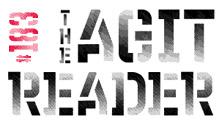
Blues Funeral
4AD
With the arrival of Blues Funeral, Mark Lanegan’s solo career essentially eclipses his work with ’90s mainstays the Screaming Trees in length and output. Which endeavor has proven more artistically fruitful is a matter of taste, but one has to hand it to the man for following his own blasted muse and ending up in a place few could have quite anticipated nearly 25 years ago.
Looking all the way back to 1990’s The Winding Sheet and its iconic cover of Leadbelly’s “Where Did You Sleep Last Night?” it’s clear that Lanegan’s preferred approach for plumbing the depths of the soul is to follow the tangled tributaries of the blues. With that in mind, Blues Funeral might strike one as a bit too on the nose for a title. On the other hand, it marks this album as both a clear departure and a way for Lanegan to embrace the ineffable elements of the form he loves, mining it as much for emotional and intellectual inspiration as riffs and lyrics.
The juxtaposition of roots motifs and electronic textures that defines Blues Funeral is at first somewhat jarring. Don’t be surprised if you initially find yourself wondering, “Umm, is this corny?” Hang in there, though, as Lanegan’s rough-hewn vocals (embodying nearly every endearing whiskey-soaked, nicotine-stained cliche this side of a Marianne Faithful album) are delivered with such blunt conviction that they pull off what at first might seem like a hard sell. Indeed, Lanegan’s singing has only gotten more evocative with age. He can unfurl a velvety graveyard croon and a boxcar growl with equal aplomb.
Like most who’ve endured the tribulations of being a pro rockstar, Lanegan has had his share of demons both corporeal and spiritual, and with lyrics such as, “Muddy water, celestial flood, I feel ya in my iron lung,” it sounds as if a battle is still being waged. Yet, Lanegan’s world-weary, skid row revelations take on a distinctly noirish, almost cinematic quality when thrown in sharp relief against his newfound love of synths and beats. The lines, “I have given to you Jane, a torn and tattered love. Do you hear the tolling bells that ring down from above?” from “Phantasmagoria Blues,” are delivered over dense, insidious synthesizers that position Lanegan at a crossroads some distance from where his earliest solo offerings were inspired, but where similar dark bargains can be struck. Meanwhile, “Ode to a Sad Disco” combines Lanegan’s desperate lamentations with what might very well pass as a genuine club banger. Though the would-be grunge icon still knows how to deliver a brawny guitar punch, as on “Riot in My House,” the overall effect here is a kind of hi-def take on the classic dark night of the soul scenario, where one isn’t alone in a room contemplating mortality, but firmly entrenched in a shimmering world of decadence, intimately aware of each wrung down the ladder to hell he or she is sliding. It can be an exhilarating trip, but you still have to pray someone catches you before you hit the bottom.
Nate Knaebel
MP3: “The Gravedigger’s Song”

Paralytic Stalks
Polyvinyl
After 10 albums and 15 years, you’d think you know what to expect from a band. However, Kevin Barnes would probably disagree with that idea. Indeed, you never quite know who’s going to show up as the captain of the ever-evolving Of Montreal. Will it be the psychedelic experimentalist, the over-the-top showman or the guy who just wants to belt out INXS covers at karaoke night? I mean, who would have thought that he’d ever collaborate with Solange Knowles (as on 2010’s False Priest)? So for as much anticipation there is to see what’s next for Of Montreal, there is an equal amount of worry that this might be the time that Barnes loses the plot entirely. With that in mind, the stage is set for Of Montreal’s latest record, Paralytic Stalks.
In recent years, Of Montreal has indulged its Prince fetish as much as its affinity for psychedelic rock. Paralytic Stalks continues that purple predilection, but notably backs away the dancefloor. Instead, Barnes seems interested in seeing just how far he can push a song into the ether and still have it be pop. Even fairly straightforward songs are wrapped in a blanket of production tricks, seemingly to both taunt the listener and protect Barnes from revealing too much. It’s like he started to pour his heart out and then got nervous. But there’s also an element of pure gleeful fancy when Barnes places stunning background vocals next to an off-kilter lead vocal, weaves songs in and out of chaotic arrangements, or pushes running times to nearly unfriendly lengths. In another person’s hands, this album might come off as a annoying and tedious exercise in self-indulgence. Instead, Paralytic Stalks is arranged like a deft DJ mix that never gets boring. It also shows that when it comes to Of Montreal, it’s best to put your expectations aside and just enjoy the ride.
Dorian S. Ham
MP3: “Dour Percentage”

Arrow
Partisan
A couple weeks ago, I was going through some old CDs and I came across a CDR simply labeled “Heartless Bastards.” Inside, the sleeve read, “My name is Erika Wennerstrom. I’m 25 years old and from Dayton, Ohio. I’ve wanted to be a songwriter since I was born.” After giving the details of the CD’s creation, Wennerstrom goes on to say that her goal is “to find a label... and to tour constantly.”
In the nearly nine years since the five songs on that demo were recorded, Wennerstrom has left Dayton (first to nearby Cincinnati before moving on to Austin) and largely accomplished all that she put into words in those liner notes, recording three albums for Fat Possum and traveling the world over. For the band’s first album in three years and first for Brooklyn-based Partisan Records, Wennerstrom has in a sense returned to her roots, with the rhythm section that played on that CDR, drummer Dave Colvin and bassist Jesse Baugh, back as Bastards once again. She’s also added guitarist Mark Nathan, and cumulatively, the band has created the finest Heartless Bastards record to date. While its predecessor, The Mountain, revealed Wennerstrom’s songs taking on greater nuances of mood and tone for the first time, Arrow seems high def by comparison. On the leading six-minute track, “Marathon.” the deep russet hue of Erika’s voice would be enough to carry the track on its own. As it is, though, the song’s slow build into a shimmering cascade of epochal Appalachian rock is absolutely spellbinding. “Got to Have Rock and Roll” is in an opposite, but equal, cosmos of Southern glam, but it is when Wennerstrom’s vocals are at the center of the universe, as on the achingly beautiful “Only for You,” that we feel the full gravity of this record. There are few, if any, moments where Arrow falters, showing the strength of both her convictions and her brothers in arms.
Stephen Slaybaugh
MP3: “Parted Ways”

Better Luck Next Life
Kanine
Jeremy Cox and Jigmae Baer are the masterminds behind the San Francisco–born, newly New York–based, Royal Baths. The West Coast–East Coast dichotomy works well for them, though, because their second full-length, Better Luck Next Life, is essentially one massive study in contrasts.
On first pass, it’s clear that the Californian rays certainly influence their sound, with slinky pedal steel–laced openers set amidst a lo-fi haze. At times, the duo sounds like a warped, zombie-fied version of the Beach Boys, namely on the opener, “Darling Divine.” But then they delve into a ’90s grunge-rock guitar freakout, and all bets are off. It’s obvious after a few songs that their influences are diverse and myriad; there’s not a clear direction or goal, but rather, an amalgamation of genres. Next Life is roughly one part surf-rock, one part garage-rock, a nice helping of late-60s psychedelia, and generous portions of lo-fi and grunge.
“Burns” is quite protracted at seven-plus minutes long, but manages to envelop the listener in a mesmerizing and comforting haze through its duration. The juxtaposition of light versus dark (in the form of female and male harmonies) is complimented perfectly by blistering guitar riffs, which, by the end, evolve into pure chaos. The cheekily titled “Faster, Harder” is neither fast nor heavy. Instead, it’s a bluesy minimalist breakdown, a la Thee Oh Sees. From here, the album throws the switch. “Be Afraid of Me” begins with a crushing psychedelic melody that builds and builds, yet somehow never tips the scale. While the rest of the album falls victim to slightly hackneyed hooks, that doesn’t diminish the complexity and depth of its beginning. Though Royal Baths may have doubts about which opposing credo they’d like to emulate going forward, Next Life is a prime example of how musically mesmerizing such a bipolar experience can be.
Jennifer Farmer
MP3: “Darling Divine”

Clay Class
DFA
On paper, there’s no reason why I shouldn’t dig the post-punk funk of British duo Prinzhorn Dance School. Indeed, even on first lesson, the minimalist herk ’n’ jerk of Clay Class, the band’s sophomore album, seems like it should be of appeal to any sucker with a sweet tooth for Gang of Four or The Fall in their prime.
What is problematic and makes it difficult to feel positively about Clay Class is its limited range of thought and sound. Despite hints of social commentary and feeling, “Seed, Crop, Harvest” lacks teeth or balls. Even when a distorted guitar cuts across the track’s simple drum and bass backing, it is still too mild seeming to be much more than slightly interesting. Elsewhere, as on “I Want You,” the synchronized vocals of Tobin Prinz and Suzi Horn are exasperatingly dull. Not their singing is flat—it’s not—but it is excruciatingly predictable. Indeed, if their vocals were completely monotone that might have been more thrilling. “Crisis Team” begins better with a three-note guitar melody, but is quickly rendered by feckless by a humdrum opening line of, “Winter is here.” As it is, there is nothing particularly artful or affecting (hell, I’d take affectations at his point) to be heard on the album. Instead, Clay Class is like listening to the seconds drip away one by one and waiting for the end to mercifully come.
Stephen Slaybaugh
MP3: “Happy in Bits”
ALBUM REVIEWS
Imperial Teen, Feel the Sound
Fionn Regan, 100 Acres of Sycamore
Ben Kweller, Go Fly a Kite
Tally Ho! Flying Nun's Greatest Bits
First Aid Kit, The Lion's Roar
Pop. 1280, The Horror
Gonjasufi, MU.ZZ.LE
Penelope Houston, On Market Street
Cardinal, Hymns
Howler, America Give Up
Snow Patrol, Fallen Empires
Errors, Have Some Faith in Magic
Buck Satan and the 666 Shooters, Bikers Welcome! Ladies Drink Free
The Big Pink, Future This
